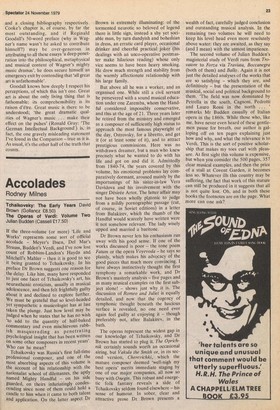Accolades
Rodney Milnes
Tchaikovsky: The Early Years David Brown (Gollancz £8.50) The Operas of Verdi: Volume Two Julian Budden (Cassell £17.50) If the three-volume (or more) 'Life and Works' represents some sort of official accolade — Meyer's Ibsen, Del Mar's Strauss, Budden's Verdi, and I've now lost count of Robbins-Landon's Haydn and Mitchell's Mahler — then it is good to see it being granted to Tchaikovsky. In his preface Dr Brown suggests one reason for the delay. Like him, many have responded to just one facet of Tchaikovsky's art, his neurasthenic eroticism, usually in musical adolescence, and then felt frightfully guilty about it and declined to explore further. We must be grateful that so level-headed yet sympathetic a musicologist has at last taken the plunge. Just how level may be judged when he states that he has no wish `to add to the quantity of half-baked commentary and even mischievous rubbish masquerading as penetrating Psychological insight that has been written on some other composers in recent years'. Who can he mean?
Tchaikovsky was Russia's first full-time professional composer, and one of the most absorbing aspects of this volume is the account of his relationship with the nationalist school of dilettantes, the aptly named Mighty Handful — on his side • guarded, on theirs infuriatingly condescending since none of them could hold a candle to him when it came to both talent and application. On the latter aspect Dr Brown is extremely illuminating: of the tormented neurotic so beloved of legend there is little sign, instead a shy yet sociable man, by turn dandyish and bohemian in dress, an erratic card player, occasional drinker and cheerful practical joker (his dealings with an unco-operative postmaster make hilarious reading) whose only vice seems to have been heavy smoking. He drew much strength and stability from the warmly affectionate relationship with his large family.
But above all he was a worker, and an organised one. While still a civil servant he persevered with a sound musical education under one Zaremba, whom the Handful considered impossibly conservative, and this at the age of 21. Three years later he retired from the ministry and emerged as a composer of sufficiently high status to approach the most famous playwright of the day, Ostrovsky, for a libretto, and get it (or at least some of it), and to attract prestigious commissions. Here was no withdrawn dreamer, but a man who knew precisely what he wanted to do with his life and got on and did it. Admittedly from 1840-74, the years covered by this volume, his emotional problems lay comparatively dormant, aroused mainly by the importunings of his sister-in-law Vera Davidova and his involvement with the singer Desire Artot. The latter affair may not have been wholly platonic to judge from a mildly pornographic passage (cut, of course, in Soviet editions) in a letter from Balakirev, which the thumb of the Handful would scarcely have written were it not somehow relevant. The lady wisely upped and married a baritone.
Dr Brown never lets his enthusiasm run away with his good sense. If one of the works discussed is poor — the tone poem Fatum or the opera Voyevoda — he says so plainly, which makes his advocacy of the good pieces that much more convincing. I have always instinctively thought the first symphony a remarkable work, and Dr Brown's masterly analysis — five pages and as many musical examples on the first subject alone! — shows just why it is. The discussion of Romeo and Juliet is equally detailed, and now that the cogency of symphonic thought beneath the luscious surface is revealed, no one need ever again feel guilty at enjoying it — though preferably not, after Balakirev, in the bath.
The operas represent the widest gap in our knowledge of Tchaikovsky, and Dr Brown has started to plug it. The Oprich nik certainly sounds worth an occasional airing, but Vakula the Smith or, in its sec ond version, Cherevichki, which the mature composer deemed 'well-nigh my best opera' merits immediate staging by one of our major companies, all now so busy with Onegin. This robust and energetic folk fantasy reveals a side of Tchaikovsky seldom found elsewhere — his sense of humour. In sober, clear and attractive prose Dr Brown presents a wealth of fact, carefully judged conclusion and outstanding musical analysis. In the remaining two volumes he will need to keep his level head even more resolutely above water: they are awaited, as they say (and I mean) with the utmost impatience.
The second volume of Julian Budden's magisterial study of Verdi runs from Trovatore to Forza via Traviata, Boccanegra (both of them) and Ballo. Again it is not just the detailed analyses of the works that are so satisfying — which they are, and definitively — but the presentation of the musical, social and political background to them. The field was now dominated by Petrella in the south, Cagnoni, Pedrotti and Lauro Rossi in the north .. . ' remarks Mr Budden casually of Italian opera in the 1860s. While those who, like me, have never even heard of these gentlemen pause for breath, our author is galloping off on ten pages explaining just how and why, and what the relevance is to Verdi. This is the sort of positive scholarship that makes my toes curl with pleasure. At first sight this volume is expensive, but when you consider the 500 pages, 357 clear musical examples, and then the price of a stall at Covent Garden, it becomes less so. Whatever ills this country may be suffering, the fact that work of this stature can still be produced in it suggests that all is not quite lost. Oh, and in both these books the footnotes are on the page. What more can one ask?.


































 Previous page
Previous page